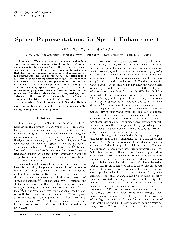摘要
This paper applies the sparse and redundant representation techniques to the problem of speech enhancement. More specifically, the K-SVD algorithm was used to train a data-driven overcomplete dictionary that describes the sparsity of speech. Orthogonal matching pursuit was employed to reconstruct the clean speech as a direct sparse decomposition technique over redundant dictionaries. Furthermore, the principle of iteration was introduced to the denoising process. When training was done on the noisy speech directly, the overall training-reconstructing algorithm became fused into one iterative procedure. Simulation shows that our proposed approach outperforms the conventional methods in terms of spectrogram analysis, objective and subjective measures.
- 出版日期2011-4
- 单位武汉大学
